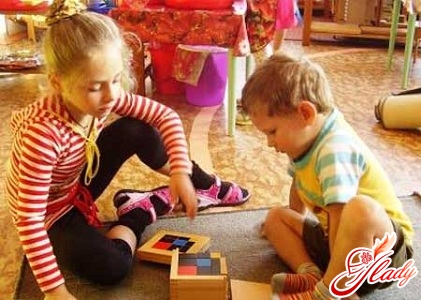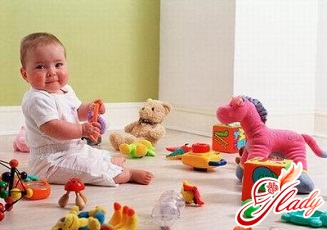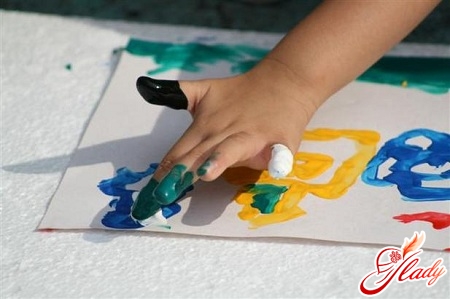 A child playing.What could be more natural? Play for children is not just entertainment, but a real vital necessity. Play is simply necessary for a child for his full and harmonious development, acquisition of necessary skills - both everyday and social communication skills. In addition, games help parents to creatively develop a child. For example, games for children to develop memory help a child learn to concentrate his attention, select from the general mass and remember the necessary information. This article briefly describes the types of games, as well as the importance of play in a child's life. This information will be extremely useful for those parents who are raising their first child and still know little about games. However, it may well be that more experienced moms and dads will be able to learn something new for themselves. So, all games are divided into several types - games for the development of attention and logic, outdoor games and role-playing games. First, we will consider games designed to develop the baby's memory and attention. Human memory is a very complex process occurring in the brain. The essence of this process is that the human brain perceives and stores certain information and, at the right moment, brings it to the surface of consciousness. Memory development is one of the primary tasks of parents. Very often you can hear parents complain that their child is doing poorly at school because he has a bad memory. However, almost no healthy child who does not suffer from serious neurological and psychological disorders has a bad memory. It is just that most often in such cases the memory is simply not developed. As a result, the child does not know how to concentrate on the information presented to him, process and systematize it. As a result, the process of memorization becomes much more complicated, becoming almost unattainable for the child. In order to understand how to develop children's memory, you need to know what it can be in general:
A child playing.What could be more natural? Play for children is not just entertainment, but a real vital necessity. Play is simply necessary for a child for his full and harmonious development, acquisition of necessary skills - both everyday and social communication skills. In addition, games help parents to creatively develop a child. For example, games for children to develop memory help a child learn to concentrate his attention, select from the general mass and remember the necessary information. This article briefly describes the types of games, as well as the importance of play in a child's life. This information will be extremely useful for those parents who are raising their first child and still know little about games. However, it may well be that more experienced moms and dads will be able to learn something new for themselves. So, all games are divided into several types - games for the development of attention and logic, outdoor games and role-playing games. First, we will consider games designed to develop the baby's memory and attention. Human memory is a very complex process occurring in the brain. The essence of this process is that the human brain perceives and stores certain information and, at the right moment, brings it to the surface of consciousness. Memory development is one of the primary tasks of parents. Very often you can hear parents complain that their child is doing poorly at school because he has a bad memory. However, almost no healthy child who does not suffer from serious neurological and psychological disorders has a bad memory. It is just that most often in such cases the memory is simply not developed. As a result, the child does not know how to concentrate on the information presented to him, process and systematize it. As a result, the process of memorization becomes much more complicated, becoming almost unattainable for the child. In order to understand how to develop children's memory, you need to know what it can be in general:
- Visual memory. This type of memory is characterized by the fact that in the mechanism of processing and storing information in humans, visual images predominate. For example, a person will remember much more quickly any information if he reads it himself, and not just hears it. People with well-developed visual memory remember places, faces - they remain in their memory for many years. As shown by numerous observations, visual memory is more often prevalent in the female half of humanity.
- Auditory memory. Auditory memory also refers to the type of memory and is characterized by the fact that a person who has a similar type of memory, much better and faster learns the auditory images. For example, information read out to such a person aloud is perceived, learned and remembered much easier than what he himself has read. This type of memory occurs in about 20% of all people.
- Motor memory. One of the most interesting and still little studied types of memory. People who have this type of memory, remarkably remember the muscle movements, the amplitude of rotation, speed and distance. This type of memory is usually very well developed in professional athletes.
Determine which type of memory is predominantin a baby, it is quite difficult. This can be determined more reliably at about 5-6 years of age and later. And before this age, parents should direct their efforts to the development of all types of memory.
Let's start with the description of games for the smallest children

The following games are intended for older children:
After the baby gets tired of looking out the window,a "magic" bag will come to the aid of the mother, which must be prepared in advance. Any small bag will do for these purposes, which must be tied in such a way that only the baby's hand fits in. Place inside the little things that you have prepared in advance, which can please your baby. These can be small cars, dolls, rubber bands or sweets. We think that every mother knows exactly what her baby will like.
Role-playing games
If we talk about such a phenomenon as developmenta child after one year, games do not cause any particular difficulties. But the issue of games for older children must be approached a little more carefully. Some of the most useful games are the so-called role-playing games, in which the child plays a certain role. It would seem that the game of "mothers and daughters", adored by all the girls of the world, which has been played for probably more than one century, is completely simple in its essence and does not carry a special pedagogical load. However, in fact, this first impression is deceptive and is a huge misconception. It is in such role-playing games that the child's social adaptation, his acquaintance with the way of life of this world, the search for his own self takes place. Such games are simply necessary for a child, without them, the child's development will significantly lag behind the development of his peers. In addition, after observing the role-playing games of your son or daughter, you can learn a lot about yourself and other adults around the child. Children very accurately copy the behavior of adults in games, and even their intonations. Perhaps, after watching your daughter's conversation with her doll, you will recognize yourself. For a long time, child psychologists have been using role-playing games as a powerful means of psychocorrection and diagnostics. If a child has any psychological problems, it is the role-playing game that will allow the specialist to determine what is bothering the child. And the same role-playing game can correct the situation. For example, if your baby does not want to go to kindergarten: cries and flatly refuses to stay there, a role-playing game in kindergarten will help to find out what is bothering the baby. Maybe the child has difficulties in communicating with peers or even with teachers. As was said above, children in role-playing games very accurately copy all life situations in which they find themselves. Role-playing games can also help parents cope with many childhood fears. Is your little one afraid of the dark? Or maybe he is worried before his first trip to kindergarten? Play out the situation that scares the child - very soon the baby will laugh at his own fears. Role-playing games are no less important in preparing a child for changes in his life or non-standard situations. For example, your child is about to visit the dentist for the first time in their life and they are worried. Play out the dentist's visit with a doll. In no case should you forget even the smallest details, such as a handkerchief. Children are very observant of such trifles. Also, with the help of role-playing games, parents can significantly raise their child's self-esteem. Is your son or daughter embarrassed to be in the company of peers, shy and indecisive? Play with them! Play a lot and often, playing out all those situations in which your child is embarrassed. Let them be both one acting party and the other. In 90% of cases, such games help children learn how to behave in different situations and gain self-confidence.
Games that develop the child's abilities
 The role of play in learning cannot be overestimated.Teaching a child through play is much more interesting and productive, the child is much more willing to study. During play, the child not only gets acquainted with geometric shapes, colors and sizes, but also learns to read and count. Parents should not immediately rush and buy the most expensive teaching aids. To introduce the baby to numbers and letters, you can use ordinary cardboard cards, which are easy to make yourself. To make them, you will need thick cardboard, colored markers and transparent tape. Cut the cardboard into equal cards, write letters and numbers on it. You can also glue cubes from cardboard. Cover the cardboard with tape on top - this will give the cards durability and allow the child to play with them even in the bathroom. However, parents should remember that learning through play should first and foremost remain a game. In no case should you force a child to do anything against his will. Such forced learning can lead to a completely opposite effect - you can discourage the desire to study for many years. Today, you can find games on sale that promote the development of children's creativity. Almost any children's toy store offers parents a very wide choice:
The role of play in learning cannot be overestimated.Teaching a child through play is much more interesting and productive, the child is much more willing to study. During play, the child not only gets acquainted with geometric shapes, colors and sizes, but also learns to read and count. Parents should not immediately rush and buy the most expensive teaching aids. To introduce the baby to numbers and letters, you can use ordinary cardboard cards, which are easy to make yourself. To make them, you will need thick cardboard, colored markers and transparent tape. Cut the cardboard into equal cards, write letters and numbers on it. You can also glue cubes from cardboard. Cover the cardboard with tape on top - this will give the cards durability and allow the child to play with them even in the bathroom. However, parents should remember that learning through play should first and foremost remain a game. In no case should you force a child to do anything against his will. Such forced learning can lead to a completely opposite effect - you can discourage the desire to study for many years. Today, you can find games on sale that promote the development of children's creativity. Almost any children's toy store offers parents a very wide choice:
- All kinds of designers. Designers remarkably develop logic, dexterity, imaginative thinking and fine motor skills. Also, in the process of collecting, children learn to make their first independent decisions. There is a huge selection of designers for kids of all ages - from one-year-old crumbs to schoolchildren.
- Cubes. Children are very fond of all kinds of cubes: plastic, wooden, cloth, all colors and sizes. Cubes also develop the child's creative abilities.
- Coloring and color pencils, as well as gouache, will help your child express themselves without limiting themselves. In addition, drawing can take the child's attention for a long time.
This is just a little of what could beinteresting and useful for your baby. The main thing that parents need to remember is that parental participation in any game is highly desirable, if not direct, then at least indirect. After all, your baby needs your attention more than anything else in the world! We recommend reading:









